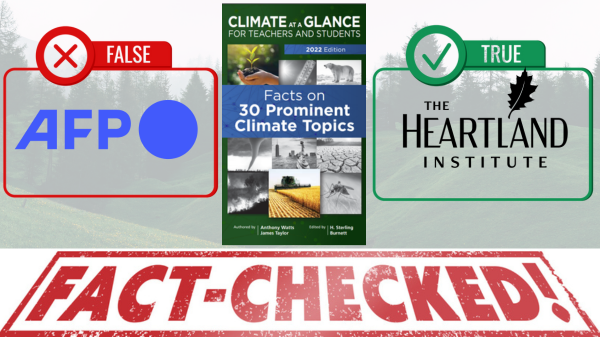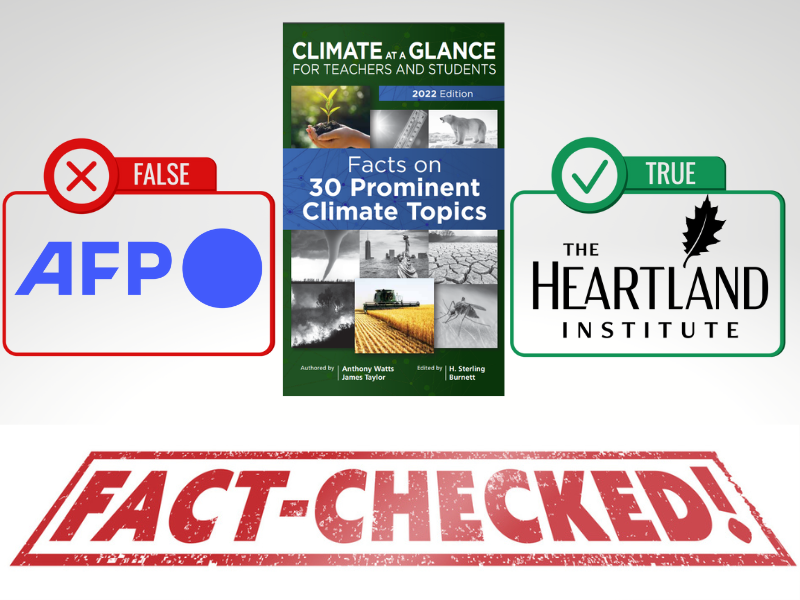YOU SHOULD SUBSCRIBE TO CLIMATE CHANGE WEEKLY.
IN THIS ISSUE:
- Fact-Checking Fact-Deprived Fact Checkers
- Podcast of the Week: Offshore Wind Is Plagued by Environmental and Economic Headwinds (Guest: David Wojick)
- Coal Use Growing, Defying Climate Commitments
- ESG-Promoting Banker Calls for Property Confiscation
- Video of the Week:Exploring Energy: Solar Power
- BONUS Video of the Week: Heartland’s Jim Lakely Fact Checks AFP’s Climate Fact Check
- Climate Comedy
- Recommended Sites
Miss Anything at Heartland’s Climate Conference? No Problem.

Fact-Checking Fact-Deprived Fact Checkers

A funny thing happened on the way to Agence France-Presse’s (AFP) fact check of The Heartland Institute’s Climate at a Glance (CAAG) booklet for teachers and students. They forgot to check any facts.
The Heartland Institute developed CAAG, the booklet and website where new climate science and economic claims are being posted regularly, to provide woefully lacking balance to the climate debate in an easily accessible format. Complex material is presented in a style most middle school and high school readers can understand. The topical two-page presentations have no vitriol, no opinions, and no unverified assertions. CAAG just looks at critical scientific and economic claims that the Earth faces a human-caused climate crisis, and examines them one by one in a Joe Friday fashion: “Just the facts, ma’am.” In no way, shape, or form does CAAG claim climate change is not occurring, despite the numerous statements to the contrary made by the book’s numerous factually challenged, closed-minded critics.
CAAG presents official government data and the latest reports from the U.N. Intergovernmental Panel on Climate Change (IPCC) in response to assertions that climate change is causing calamities such as more severe and numerous hurricanes, tornadoes, floods, wildfires, etc., or that climate change is causing mass die-offs of bees, coral reefs, polar bears, or most distressing of all, humans, or that climate change is swamping island nations and creating millions of climate refugees. The facts presented in these brief essays provide key balance to the climate crisis narrative being pushed on teachers and students by the mainstream media, scientists, and politicians who benefit in one way or another from false climate alarm.
The AFP ran two articles “fact checking” CAAG: one when we mailed it out in late February and a second in late March, the latter actually bearing the title “‘Infecting minds’: US book sent to teachers seeks to sow climate doubt.” An article claiming the points made in a science book are tantamount to an infection: How’s that for objective journalism?
As I told the Cowboy State Daily when they interviewed me for an article about AFP’s fact check, “Which fact was checked? They supposedly check facts. I don’t see a single piece of data or evidence where they checked a fact, as opposed to what they think the implication is of those facts we’re trying to get at.”
AFP’s first article did examine eight specific CAAG briefs out of the thirty in the book. In most of those cases, AFP confirmed our facts but added speculation along the lines of, “Yes, data cited in CAAG do show that X is not getting worse, but experts say in the future …” or “… computer models suggest in the future… .”
In short, AFP never disputes the facts we present but instead implies they can be explained away (“lack context”) or some experts dispute what normal people may conclude from the facts (that disaster is not on the way, for example). To be clear, computer models’ projections about the future and experts’ prognostications about what is to come are no more “facts” about the real world than are some carney side show psychic’s predictions. Climate models don’t reflect reality well. They are flawed in ways that consistently make their core projection, the temperature response to carbon dioxide, run far too hot. If their temperature claims are wrong, any projections that flow from them about trends in human health or weather extremes are likewise untenable. Experts’ opinions about the future are not facts either. CAAG, by contrast, presents facts, and they stand or fall based on the data.
Let’s look at a few examples of the AFP’s laughable fact check. Concerning crops, CAAG states, “As the climate modestly warms, global crop yields have set new records almost every year. That is due, in part, to longer growing seasons and greater concentrations of carbon dioxide in the atmosphere.” Those are facts. AFP’s response: “Warmer temperatures and CO2 play a part in boosting crop yields but…” So, fact confirmed. The “but” part of the statement consists of experts claiming the trends are reversing and, based on counterfactual computer-model simulations of the past, that yields would have grown even faster but for climate change. Those are not facts, just unsubstantiated claims.
CAAG cites data from the U.N. Food and Agriculture Organization (FAO) showing crop yields and production across all regions of the world have been regularly setting new records. Ignoring numerous peer-reviewed studies, thousands of field experiments, the experience of greenhouse operators all over the globe, and the implications of the FAO’s own data, AFP quotes an email from the FAO saying, “there was however no evidence that more CO2 in the atmosphere was good for sustainable agriculture.” Evidently that means crops grown “sustainably,” however that is defined, are not like regular plants, for which CO2 boosts growth, improves water use, and is largely responsible for a tremendous greening of the Earth. But hey, it was in an email from the FAO, so it must be true.
CAAG states, “Corals thrive in warm water, not cold water, and recent warming has allowed corals to expand their range. The primary causes of coral bleaching are not ‘global warming,’ but sediment and agricultural chemical run offs.” The AFP fact check admits the EPA confirms sedimentation as a “primary stressor” of corals and cites other local threats such as chemical runoffs.
If you feel a but… coming, that’s because it is. AFP cites experts claiming coral bleaching is becoming more common in response to warming oceans. Bleaching events, however, do not necessarily equate to coral deaths, even if driven by temperatures. Apparently AFP does not always love “context.” The evidence shows (and by evidence, I mean hard data produced by scientific surveys) that most corals recover after warming-induced bleaching; they adapt or evolve to thrive in warmer temperatures. New corals are being discovered all the time, and data show coral extent is increasing.
AFP also “fact-checked” CAAG’s claims on hurricanes. “The United Nations Intergovernmental Panel on Climate Change (IPCC) has found no increase in the frequency or severity of hurricanes despite modest warming,” CAAG states. That is a fact, and AFP’s own analysis confirmed our claim is accurate. But of course they had to add a scary conjecture: “As AFP has reported, the number of hurricane landfalls has not significantly risen in the United States. However, the global proportion of tropical cyclones reaching very intense (Category 4 and 5) levels is projected to increase due to human-caused warming this century, according to the NOAA.”
In case you missed it, AFP confirmed there is no increase in hurricane numbers. So, unable to refute the CAAG’s claims, AFP pivoted to a statement from an agency controlled by President Joe Biden, which says hurricanes are likely to get worse in the future. That represents what AFP evidently considers refutation of an accurate, data-driven statement. In case you were curious—which AFP evidently wasn’t—in the 35 years of warming since NASA’s James Hansen first told the U.S. Senate humans were causing global warming, hurricane intensity has declined, not increased, with the number of major hurricanes falling.
NOAA, as cited by AFP, is telling us to “trust our projections, not the lying data” and saying, “Yeah, even though the physics won’t change and hurricanes haven’t followed the script so far, we’re sure things will turn around and hurricanes will get worse.”
At Heartland, we stick with real data. A fact check should consist of confirming or refuting claims about what is, not treating as a fact what some purported expert or group says might occur at some point in the future.
Other CAAG fact checks conducted by AFP largely consist of the organization citing experts claiming the historical data on which the book based its trendlines are unreliable. In some cases, bureaucrats at federal agencies have removed public data relied on by the government itself and by top researchers to produce thousands of peer-reviewed articles over decades, saying they now don’t trust the sources for the data or their collection methods. Among the facts about which AFP makes this complaint are our reports on growing polar bear populations and declining wildfire and heat wave trends.
Recent data on polar bears is clear and indisputable: their population has increased substantially over the past few decades. As to wildfires, NASA has documented a 25 percent decline in acreage lost to wildfires globally since 2003. The modest recent uptick of wildfires in the western United States is an anomaly in global trends, not linked to climate change. It is a response to localized drought conditions combined with changed federal-government forest management practices that have increased the amount of fuel (dead trees and brush) and made it hard to suppress fires once they start. SUVs have nothing to do with it.
The experts AFP quotes to refute the hard data presented by CAAG don’t replace the datasets CAAG cites with improved datasets, so they cannot say for sure whether polar bear, wildfire, or heat wave numbers in the past were better or worse in the past than today, because there is no basis for comparison if you throw out the existing data. If they are right, the accurate claim is, “We just don’t know about trends for these phenomena,” not, “The trends have gotten worse.”
AFP and the experts it quotes should be careful about casually dismissing the accuracy of past data. Estimates of past temperatures, flood and drought frequency and severity, sea ice and glacier extent, etc., are all based on various types of proxy data taken from a relatively disparate and small group of locations or written histories. If that data is not to be trusted, we know nothing about climate before modern instrumentation and data collection methods. Is that really a road the APF and its experts want to go down? Talk about opening the door to extreme skepticism about climate change!
Despite its facade of objectivity and legitimacy, AFP’s fact check is a polemical broadside, not a serious analysis of the claims we make in the CAAG book. We at The Heartland Institute hope teachers, students, and other interested parties will see past the smoke AFP is trying to blow and will examine the book for themselves. If they do, the evidence will make for a lively debate about the causes and likely consequences of climate change.
Sources: France 24; Agence France-Press; Cowboy State Daily; Climate at a Glance; The Heartland Institute YouTube page
The Climate Change Weekly Newsletter has been moved to HeartlandDailyNews.com. Please check there for future updates!





